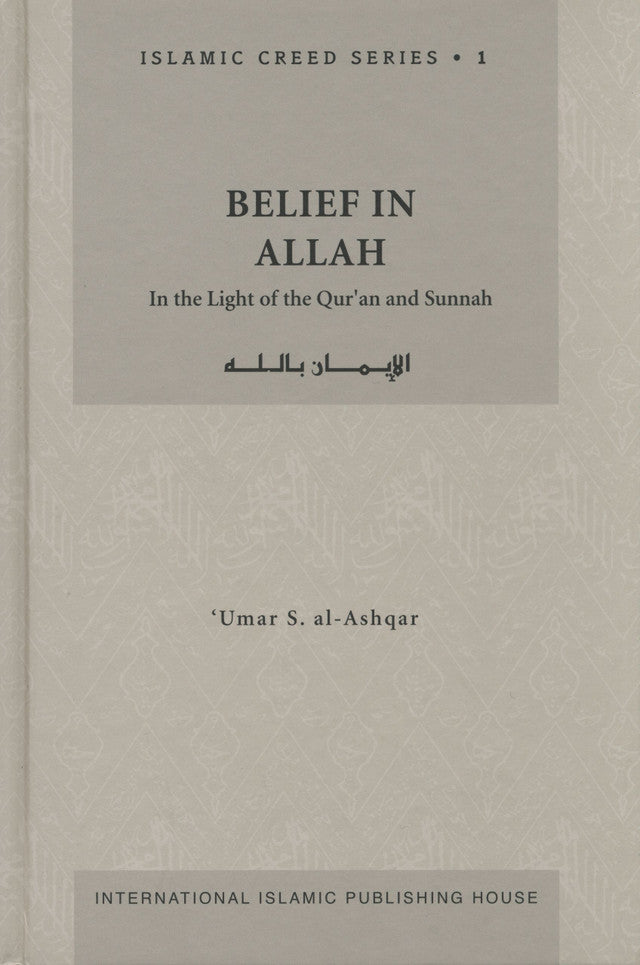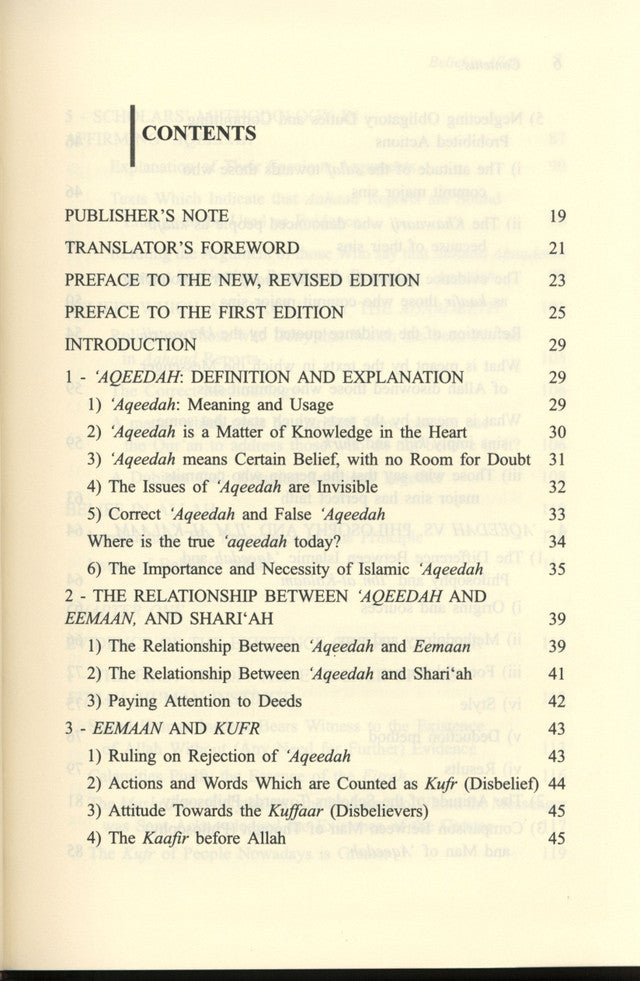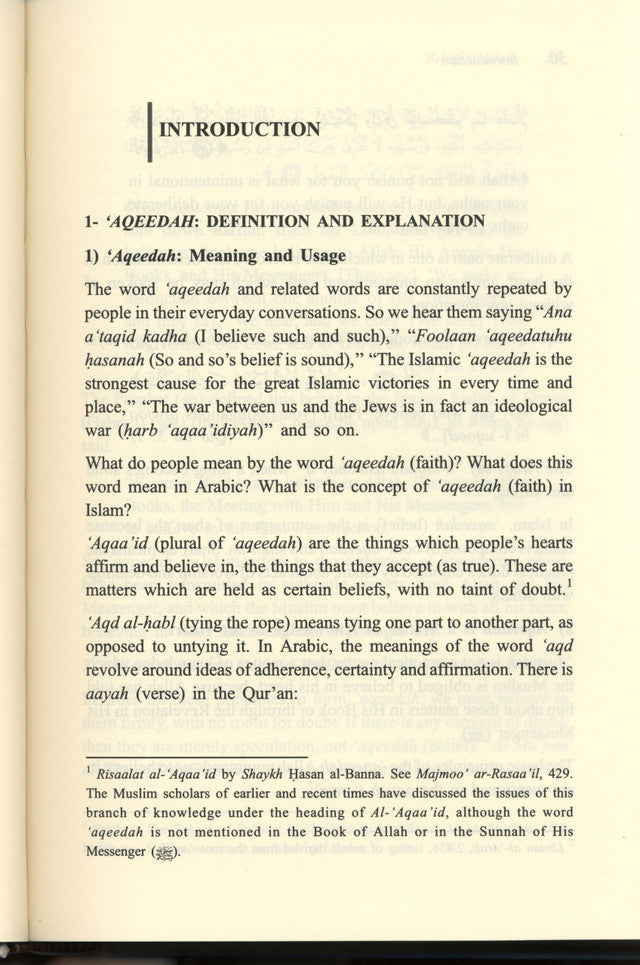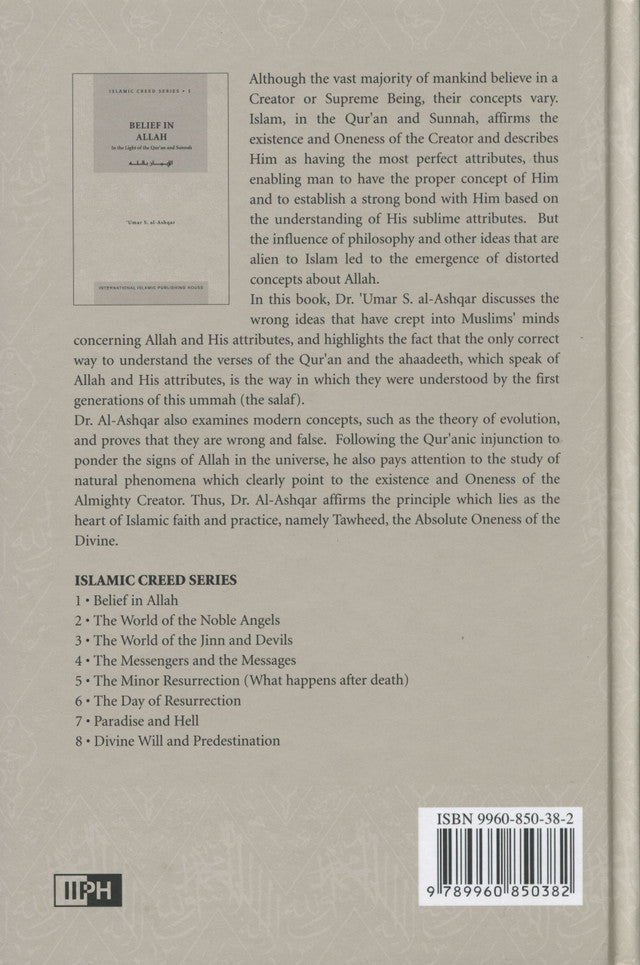Belief in ALLAH : Islamic Creed Series 1
Belief in ALLAH : Islamic Creed Series 1
Publisher:
IIPH (International Islamic Publishing House)
Author:
Dr. Umar S al-Ashqar
Language:
English
Binding:
Hard Cover
Pages: 479
Size: 15x22cm
Couldn't load pickup availability




Collapsible content
Description of Book
Belief in ALLAH : Islamic Creed Series 1
Publisher
IIPH (International Islamic Publishing House)
Author
- Dr. Umar S al-Ashqar
Sample Pages - Content
Page:01
ISLAMIC CREED SERIES 1
BELIEF IN
ALLAH
In the Light of the Qur'an and Sunnah
الإيمـان بـالـــلـــه
'Umar S. al-Ashqar
INTERNATIONAL ISLAMIC PUBLISHING HOUSE
Page:02
Belichies
8
5-SCH
BAD The Cootsgildo gritolo (
AFFIRM CONTENTS
anoita A botididor
PUBLISHER'S NOTE
TRANSLATOR'S FOREWORD
PREFACE TO THE NEW, REVISED EDITION
PREFACE TO THE FIRST EDITION
vid botoupisat
INTRODUCTION
1- 'AQEEDAH: DEFINITION AND EXPLANATION
1) Aqeedah: Meaning and Usage
29
eldedW
2) Aqeedah is a Matter of Knowledge in the Heart
30
1) Ruling on Rejection of 'Aqeedah
3) Aqeedah means Certain Belief, with no Room for Doubt 31
4) The Issues of 'Aqeedah are Invisible
5) Correct 'Aqeedah and False Aqeedah
Where is the true 'aqeedah today?
6) The Importance and Necessity of Islamic 'Aqeedah 2- THE RELATIONSHIP BETWEEN AQEEDAH AND EEMAAN, AND SHARI'AH
1) The Relationship Between 'Aqeedah and Eemaan
bp
34
odT (1)
35
igno (1
39
(ii
39
41
42
43
43
2) The Relationship Between 'Aqeedah and Shari'ah (iii 3) Paying Attention to Deeds.
3- EEMAAN AND KUFR ears Wit
2222222233
19
21
25
29
29
2) Actions and Words Which are Counted as Kufr (Disbelief) 44
3) Attitude Towards the Kuffaar (Disbelievers)
45
4) The Kaafir before Allah
Meinl news
him
(
45
owadays is Grehosp to neM bas
119
Page:03
INTRODUCTION
TION
الم العلامة
DE
ni fanoitastninu ai
1- 'AQEEDAH: DEFINITION AND EXPLANATION
1) Aqeedah: Meaning and Usages
The word 'aqeedah and related words are constantly repeated by people in their everyday conversations. So we hear them saying "Ana a'taqid kadha (I believe such and such)," "Foolaan 'aqeedatuhu hasanah (So and so's belief is sound)," "The Islamic 'aqeedah is the strongest cause for the great Islamic victories in every time and place," "The war between us and the Jews is in fact an ideological. war (harb 'aqaa'idiyah)" and so on.
What do people mean by the word 'aqeedah (faith)? What does this word mean in Arabic? What is the concept of 'aqeedah (faith) in Islam?
'Aqaa'id (plural of 'aqeedah) are the things which people's hearts affirm and believe in, the things that they accept (as true). These are matters which are held as certain beliefs, with no taint of doubt.1
'Aqd al-habl (tying the rope) means tying one part to another part, as opposed to untying it. In Arabic, the meanings of the word 'aqd revolve around ideas of adherence, certainty and affirmation. There is aayah (verse) in the Qur'an: bogildo
then they
in the
1 Risaalat al-'Aqaa'id by Shaykh Hasan al-Banna. See Majmoo' ar-Rasaa'il, 429. The Muslim scholars of earlier and recent times have discussed the issues of this branch of knowledge under the heading of Al-'Aqaa'id, although the word 'aqeedah is not mentioned in the Book of Allah or in the Sunnah of His Messenger().
Page:04
ISLAMIC CREED SERIES
BELIEF IN
ALLAH
الإمار بالله
Umar al-Abgar
Although the vast majority of mankind believe in a Creator or Supreme Being, their concepts vary. Islam, in the Qur'an and Sunnah, affirms the existence and Oneness of the Creator and describes Him as having the most perfect attributes, thus enabling man to have the proper concept of Him and to establish a strong bond with Him based on the understanding of His sublime attributes. But the influence of philosophy and other ideas that are alien to Islam led to the emergence of distorted concepts about Allah.
In this book, Dr. 'Umar S. al-Ashqar discusses the wrong ideas that have crept into Muslims' minds concerning Allah and His attributes, and highlights the fact that the only correct way to understand the verses of the Qur'an and the ahaadeeth, which speak of Allah and His attributes, is the way in which they were understood by the first generations of this ummah (the salaf).
Dr. Al-Ashqar also examines modern concepts, such as the theory of evolution, and proves that they are wrong and false. Following the Qur'anic injunction to ponder the signs of Allah in the universe, he also pays attention to the study of natural phenomena which clearly point to the existence and Oneness of the Almighty Creator. Thus, Dr. Al-Ashqar affirms the principle which lies as the heart of Islamic faith and practice, namely Tawheed, the Absolute Oneness of the Divine.
ISLAMIC CREED SERIES
1. Belief in Allah
2. The World of the Noble Angels 3. The World of the Jinn and Devils
4. The Messengers and the Messages
5. The Minor Resurrection (What happens after death)
6. The Day of Resurrection
7. Paradise and Hell
8. Divine Will and Predestination
IIPH
ISBN 9960-850-38-2
9789960 850382
Who is Dr. Umar S al-Ashqar?
Dr. Umar S. al-Ashqar (1930–2012) was a prominent Islamic scholar known for his significant contributions to Islamic theology, particularly in the areas of aqeedah (Islamic creed) and fiqh (Islamic jurisprudence). He was a professor at the University of Jordan and authored several widely respected books that simplified complex theological concepts for a broad audience.




